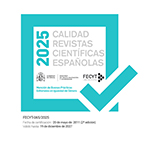La emergencia de un imaginario latinoamericanista y antiestadounidense del orden hemisférico: de la Unión Panamericana a la Unión Latinoamericana (1880-1913)
Resumen
A partir de una exploración de las ideas y las carreras de tres políticos e intelectuales argentinos como Vicente Gregorio Quesada, Roque Sáenz Peña y Manuel Ugarte, el artículo analiza la emergencia de un imaginario cultural, diplomático y legal antiestadounidense en Argentina entre finales del siglo XIX y comienzos del siglo XX, en el contexto de emergencia del panamericanismo y de los Estados Unidos como un poder hegemónico en América. El propósito del artículo es reexaminar los orígenes ideológicos del antiimperialismo latinoamericano, revisando el supuesto según el cual el imaginario antiestadounidense en Argentina estuvo dominado por una crítica culturalista e idealista de los Estados Unidos y ante todo enfatizando la importancia que tuvo en la formación de dicho imaginario el discurso del derecho internacional y la historia diplomática propuestos por la elite intelectual y política patricia. Asimismo, se explora la influencia que tuvo este discurso legal que se deriva de los escritos y la práctica diplomática de la elite patricia en la formación del antiimperialismo latinoamericano moderno que se conformó de manera sólida hacia comienzos del siglo XX, particularmente luego del proceso de la Reforma Universitaria en América Latina y que tuvo a Manuel Ugarte como una de sus figuras más emblemáticas.Descargas
Descarga artículo
Licencia
La Revista Complutense de Historia de América, para fomentar el intercambio global del conocimiento, facilita el acceso sin restricciones a sus contenidos desde el momento de su publicación en la presente edición electrónica, y por eso es una revista de acceso abierto. Los originales publicados en esta revista son propiedad de la Universidad Complutense de Madrid y es obligatorio citar su procedencia en cualquier reproducción total o parcial. Todos los contenidos se distribuyen bajo una licencia de uso y distribución Creative Commons Reconocimiento 4.0 (CC BY 4.0). Esta circunstancia ha de hacerse constar expresamente de esta forma cuando sea necesario. Puede consultar la versión informativa y el texto legal de la licencia.











